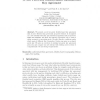Free Online Productivity Tools
i2Speak
i2Symbol
i2OCR
iTex2Img
iWeb2Print
iWeb2Shot
i2Type
iPdf2Split
iPdf2Merge
i2Bopomofo
i2Arabic
i2Style
i2Image
i2PDF
iLatex2Rtf
Sci2ools
CTRSA
2005
Springer
2005
Springer
A New Two-Party Identity-Based Authenticated Key Agreement
We present a new two-party identity-based key agreement that is more efficient than previously proposed schemes. It is inspired on a new identity-based key pair derivation algorithm first proposed by Sakai and Kasahara. We show how this key agreement can be used in either escrowed or escrowless mode. We also describe conditions under which users of different Key Generation Centres can agree on a shared secret key. We give an overview of existing two-party key agreement protocols, and compare our new scheme with existing ones in terms of computational cost and storage requirements.
Related Content
| Added | 26 Jun 2010 |
| Updated | 26 Jun 2010 |
| Type | Conference |
| Year | 2005 |
| Where | CTRSA |
| Authors | Noel McCullagh, Paulo S. L. M. Barreto |
Comments (0)

